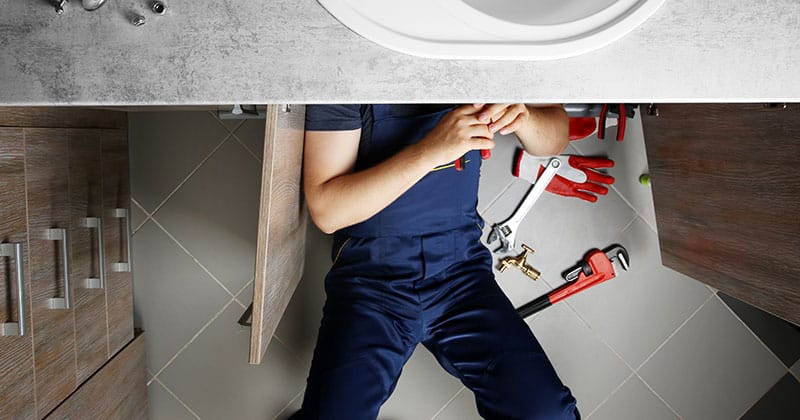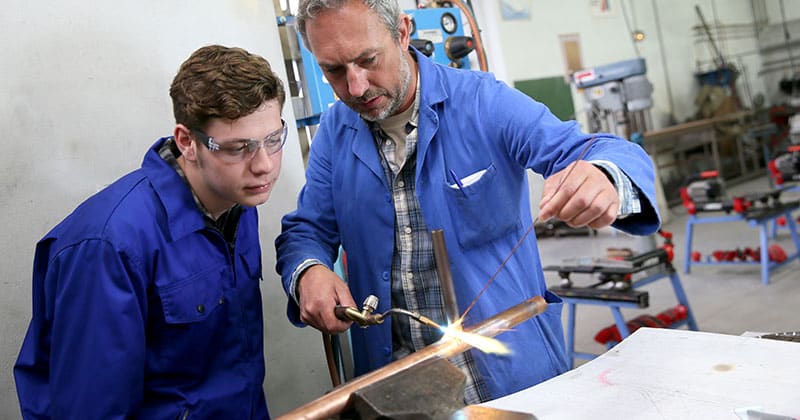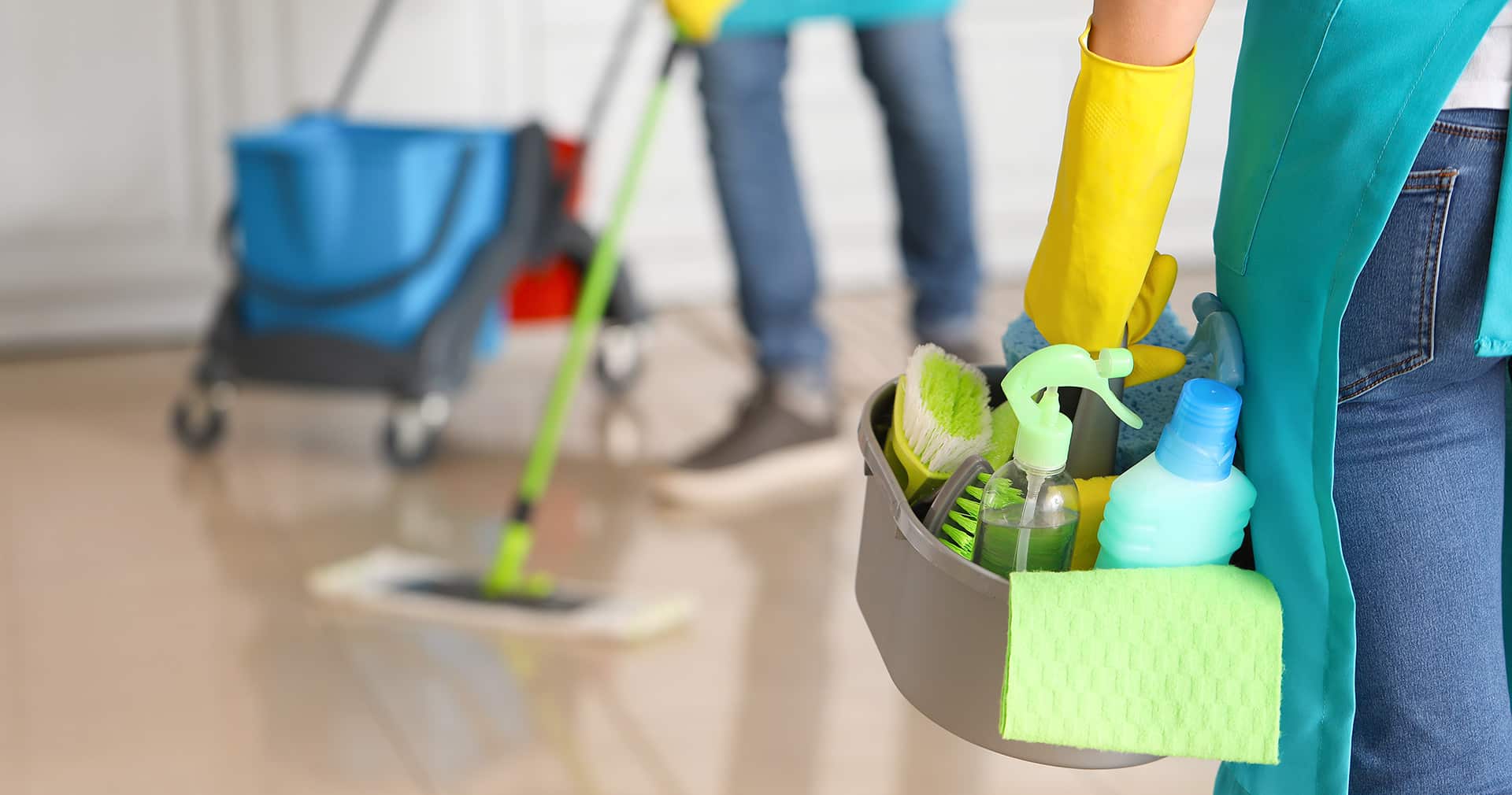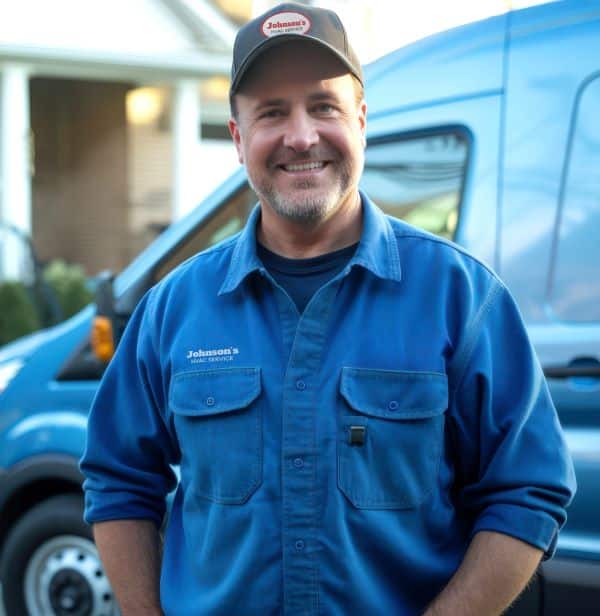Hire the Best: The Top 5 Plumbing School Programs
Are you an aspiring plumber? Good news—over the next decade, about 43,000 new jobs will open up each year. Get ready by starting your plumbing school program now. We’ll guide you to the best ones.

Managing Editor
Are you an aspiring plumber? Good news—over the next decade, about 43,000 new jobs will open up each year.
The occupation is growing 6% faster than the average, which means there are plenty of opportunities for talented and passionate plumbers.
If you’re interested in pursuing one of those jobs, now is the time to start building your skillset. First up—choosing the right plumbing school program.
We’ll help you start your journey by reviewing what to look for in a plumbing school and the top programs in the U.S. to consider for your education. Plus, we’ll answer those burning FAQs we know you have.
Ready to take the plunge? Let’s do it!
Benefits of Formal Plumbing Education
Plumbers have quite a responsibility—and a big one at that.
Customers will rely on you to install, repair, and maintain one of the most crucial systems in their homes and businesses. To be the very best plumber you can be for them, you need to know the ins and outs of the trade.
On-the-job training is a great start. An apprenticeship—which is required—will give you many of the hands-on skills you’ll need.
Formal education, however, still plays an important role.
Completing a plumbing school program will help you develop other crucial career skills, such as critical thinking, problem-solving, and communication. And with these extra tools in your box, you’re sure to excel in the field.
During your course, you’ll learn things like:
- Industry best practices
- Safety regulations and codes
- Advanced troubleshooting techniques
- Niche or specialized skills
- Soft skills, like communication
With this insight, you can tackle all kinds of jobs with confidence. The benefits?
- Better customer service
- The ability to solve a more diverse range of problems
- A credential to market that helps you stand out and look like an industry authority
- Increased likelihood of landing that one job you really want

What Makes a Great Plumbing School Program?
You’re committed to your future and excited to put your best foot forward. Now, it’s time to find a plumbing program that’ll help you do exactly that.
Let’s start with a basic checklist of what to look for in a plumbing program:
- A well-respected school with positive reviews from students and employers
- A program that meets industry standards and is recognized by professional organizations
- Affordable tuition with options for financial aid or payment plans
- Evening classes or online modules to fit your schedule
- Inspiring teachers with real-world plumbing experience
- Plenty of practical experience to prepare you for real job sites
- A plumbing trade school that’s conveniently located
- An exceptional student experience that fosters a genuine love of learning
What You’ll Learn
There’s a lot to learn about the plumbing trade. You can expect any credible program to cover many of these essential and sometimes advanced topics. Courses will likely cover a mix of theoretical knowledge and practical know-how.
Here’s some of what you can expect to learn in a reputable program:
- Proper use of safety gear like gloves and safety glasses
- How to avoid contamination risks
- Math like fractions and conversions (and how to apply them in the field)
- How to handle plumbing tools
- How to choose the right pipes and fixtures
- Reading and interpreting blueprints and building plans
- State and local building codes
- Proper fixture and appliance installation
- Maintenance of commercial and residential plumbing systems
- How to prepare accurate cost estimates for clients
Red Flags to Watch Out For
Not all plumbing courses are created equal. Along with boxes to check, there are some red flags to watch out for as you’re considering your options.
For one, avoid courses that promise you the world. If a program makes far-fetched claims about a magical plunger or guaranteed job placement, it’s best to steer clear.
Another red flag is a very high cost. Spending more doesn’t guarantee a better education, so stick to your budget. Compare options, so you know you’re getting good value.
Finally, there’s no point in investing time and money in a course that isn’t recognized by the industry. Always check that the program is accredited and meets the latest professional standards.

The Top 5 Plumbing School Programs in the U.S.
It’s time to jump into the best of the best. Below, we’ve curated a list of the top plumbing school programs in the U.S.
Here are the criteria we took into consideration when we made our selection:
- A five-star reputation
- Courses recognized by the plumbing industry
- Comprehensive topic coverage, including a mix of theoretical and practical skills.
- Exceptional student feedback
Let’s dive in!
1. Atlanta Technical College
First up on our list of plumbing trade schools is Atlanta Technical College (ATC) in Atlanta, Georgia.
This school offers hands-on training designed to prepare you for the job market. It combines plumbing theory with practical skills so that you can jump right into the workforce.
Courses offered:
Standout features:
- Hands-on training that mirrors real-world job sites
- A curriculum that blends technical skills with workplace knowledge
- Prepares graduates for entry-level positions as apprentices
Learn more: Visit Atlanta Technical College’s website to read up on why these programs made our list.
2. Apex Technical School
Next on our list, we have Apex Technical School in Long Island, New York.
Apex offers a well-rounded plumbing and pipefitting program with over 900 hours of content.
Courses offered:
- Basic Plumbing
- Residential Plumbing
- Commercial Plumbing
- Plumbing and Heating
- Pipefitting Level One
- Pipefitting Level Two
Standout features:
- 900 hours of combined classroom and hands-on training
- Full-time and part-time schedule options for flexibility
- Covers both residential and commercial plumbing applications
- Includes pipefitting training around sprinkler systems and pipe fabrication
Learn more: Visit Apex Technical School’s website to read up on why these programs made our list.
3. Erwin Technical College
Looking for a sunny spot to hone your plumbing skills? Check out Erwin Technical College down in Tampa, Florida.
This school’s program offers great value for cost with access to state-of-the-art equipment.
You’ll learn to install, maintain, repair, and troubleshoot systems in real-world conditions. Topics covered include plumbing codes, tool safety, new construction, and repairs.
Course offered:
Standout features:
- Training with state-of-the-art equipment
- Covers essential skills like installation and maintenance
- Teaches plumbing codes and industry regulations
- Includes certifications like HBI Plumbing, OSHA 30, and Forklift Operation
Learn more: Visit Erwin Technical College’s website to read up on why these programs made our list.
4. Cleveland Community College
In Shelby, Cleveland County, North Carolina, you’ll find a great option to learn the plumbing trade at Cleveland Community College. Its wide range of plumbing courses has earned it a spot on our exclusive list.
Looking for quick entry into the trade? Maybe you want more in-depth education. Or perhaps you’re looking to specialize in commercial plumbing. Whatever your goals, Cleveland Community College has something for you.
Courses offered:
- Additional courses like Modern Plumbing, Plumbing Systems, Plumbing Estimates, and Plumbing Codes
Standout features:
- Flexible options with both diploma and certificate tracks
- Covers everything from water systems and drainage to pipe installation and plumbing codes
- Prepares students for residential rough-in and finished work
- Includes commercial plumbing lessons
Learn more: Visit Cleveland Community College’s website to read up on why these programs made our list.
5. Montana State University
To round out our list, we’ve got Montana State University located in Havre, Montana.
Their program is the only plumbing certification of its kind in the state. It offers a mix of general education and industry-specific coursework.
Plus, graduates often leave with impressive job opportunities thanks to strong ties with Montana’s plumbing industry.
Courses offered:
- Plumbing Certificate
- Elective options in welding or technical sciences
Standout features:
- The only plumbing degree program in Montana
- Practical courses that contribute to apprenticeship hours
- Covers topics like piping, fixtures, technical graphics, and welding
- Strong industry connections for career support
Learn more: Visit Montana State University’s website to read up on why these programs made our list.

FAQs About Plumbing Education
Still wondering about certain aspects of the plumbing program journey? Let’s answer some of the most common questions about plumbing education.
How long does a plumbing course take?
The answer really depends on the type of course.
Going to a college or trade school might take one to two years. On the other hand, some course providers offer programs that run for just 12 weeks!
How much does a plumbing course cost?
Again, this depends on the course.
Earning an Associate’s Degree in Plumbing Technology, for example, can cost anywhere from $3,000 to $23,000. That’s a pretty wide range.
Shorter courses will generally cost less.
Does plumbing education include an apprenticeship?
Some plumbing education programs include a full apprenticeship. Some don’t. And some offer credit you can use toward completing your apprenticeship hours.
Always check the details of a course before you enroll. That way, you know exactly what’s in store.
Do I need formal plumbing education to be a plumber?
Not necessarily.
Technically, most positions will require a high school diploma or equivalent and a completed apprenticeship.
Formal education can give you a leg up, though. It can teach you the ins and outs of the trade, which will help you stand out.
What’s Next: How to Get Started with Plumbing School Now
-
Research local programs. Convenience is important. See whether any of the top plumbing programs on our list are local to you. If not, look up schools with plumbing programs in your area.
-
Read through program courses. Take some time to see what plumbing courses are available at various programs. See what interests you and suits your career goals.
-
Contact admissions. Schedule a call with the admissions team at the schools you’re interested in to learn more. They can tell you how to apply and when your application is due.
-
Make a plan B. If you don’t get into your first-choice school, don’t fret. Have a backup option, whether a different course or a different school.
Melissa can masterfully bring to life any form of content, whether it’s a landing page or a guide to befriending gnomes. When she’s not crafting stories, she’s either crocheting, smothering her cats in unwelcome affection, or spending time with her husband.

Business Solutions For Field Service Pros
EverPro offers specialized solutions designed for home and field service professionals. We’ve got the business tools to help you get the job done.



